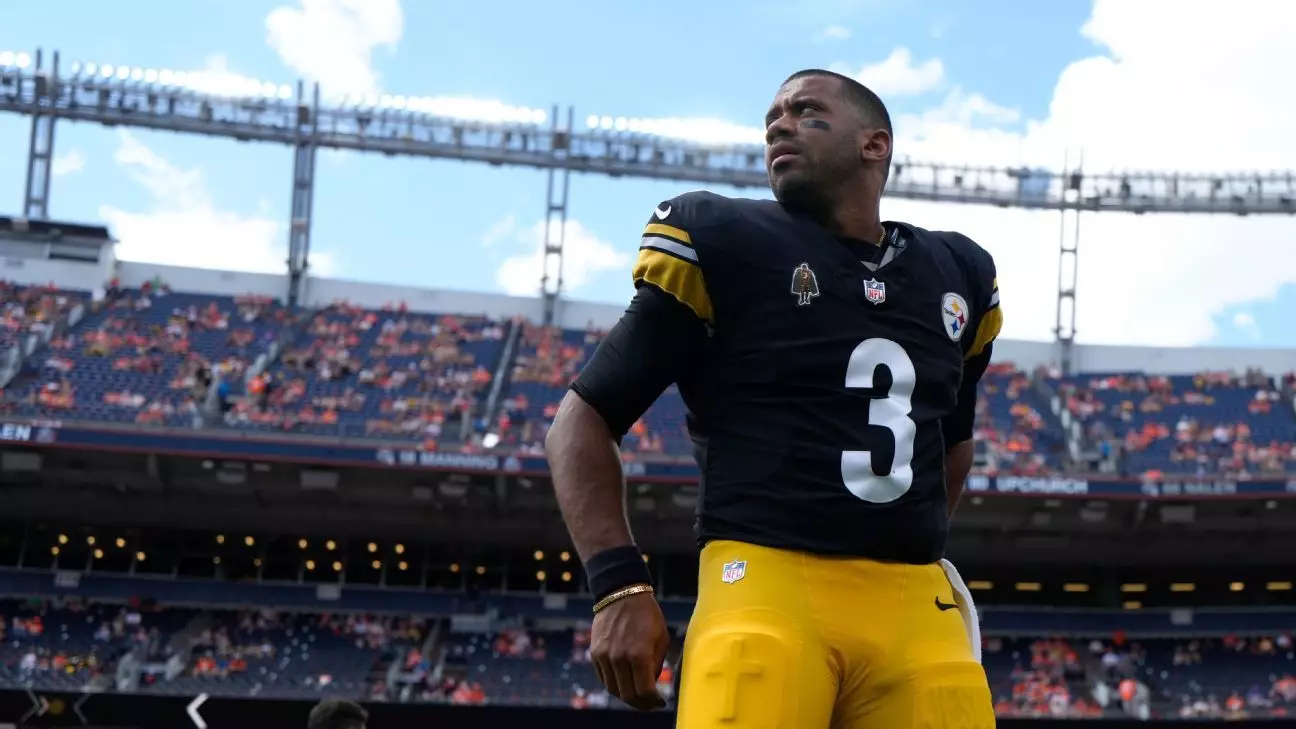Russell Wilson’s recent outing in Denver offers a fascinating lens through which to view the often tumultuous world of professional football. Although Wilson did not step onto the field during the Pittsburgh Steelers’ narrow 13-6 victory against the Broncos, the impact of his presence was palpable. Coach Mike Tomlin’s decision to award Wilson a “petty game ball” not only indicates a symbolic gesture of solidarity among teammates but also highlights the intricate emotional layers present in the world of elite sports.
In sports, particularly in a high-stakes environment like the NFL, the rituals and traditions carry immense weight. The “petty game ball” awarded to Wilson and other former Broncos encapsulates a deep-seated camaraderie and reflects the personal battles athletes often endure off the field. Wilson’s tumultuous exit from Denver—after just two seasons on a massive contract—has become a point of contention among fans and analysts alike. This recognition by Tomlin not only underscores the Steelers’ victory but also serves as a reminder of the challenges Wilson faced during his time in Denver, where he was benched amidst a contract dispute and struggles with performance.
Emotional Connections and Relationships
Post-game remarks from quarterback Justin Fields reveal the emotional landscape surrounding Wilson’s return. Fields emphasized the respect and friendship that still reign between Wilson and former Broncos teammates, painting a picture of a man whose career has intertwined with many others, both on and off the field. This camaraderie often underpins the rivalry in professional sports, yet during moments like these, those connections can be more significant than the games themselves. Wilson, despite his inactive status, took the time to reconnect with his former team, engaging in brief conversations with players and coaches. This speaks volumes about the importance of relationships in the fiercely competitive world of professional sports.
Gameplay Analysis: Fields Stepping Up
While Wilson’s return generated headlines, it was Fields who commanded the spotlight during the game. His statistics showcase a player still finding his footing but determined to leave an imprint. Completing 10 of his first 12 passes for 101 yards, Fields demonstrated a moment of brilliance with a touchdown. However, his later performance, marked by a struggle to maintain momentum, reminds fans that while potential shines brightly, consistency is the hallmark of a successful quarterback. His experience illustrates that even in victory, the learning curve remains steep in the NFL.
The Evolving Nature of Quarterback Challenges
Wilson’s experience reflects broader themes resonating throughout the league. His current struggle with an aggravated calf injury means he is not only battling physical setbacks but also navigating the psychological toll of being sidelined for consecutive games. The dual burden of living up to hefty financial expectations while grappling with his own performance creates a unique pressure that few can understand.
As Wilson sidelines himself and watches his former teammates, fans can only speculate on how he plans to reclaim his standing in the league. Each sideline conversation, every warmup on the field, might signify a man determined to adjust his narrative—one that until recently had been defined by scrutiny and setbacks.
Russell Wilson’s journey from star quarterback to sidelined player embodies a unique subplot in the saga of NFL rivalries. His “petty game ball” symbolizes not only a triumph over past adversities but also a reminder of the harsh realities of professional sports. While Fields celebrated a personal win in challenging conditions, Wilson’s resilience and emotional connections echo the multitude of forces at play in this high-stakes arena. The aftermath of such games goes beyond mere statistics; they delve into the psyche of athletes and reveal the power of human connection in a sport often dominated by statistics, strategy, and performance. With every passing week, one must wonder: how will Russell Wilson continue to rewrite his own narrative?

Leave a Reply